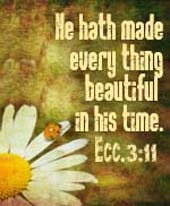
When it comes to education it's important to keep a balanced view of things. This is true because, all areas of life demand that we keep a balanced view. It's the way it is. Years ago when Charlotte Mason promoted the now well known motto 'Education is an Atmosphere, a Discipline, a Life', none of these thoughts were 'new'. The emphasis of atmosphere in education wasn't original to her. Neither were these: 'Education is a Life' or 'Education is a Discipline'. These thoughts have all come and gone again and again. Taken individually, none is complete. Alone, each tends to one extreme or another.
As important as each aspect is, for example, atmosphere is not enough. It isn't enough to have a beautiful classroom, the best equipment and the picture perfect teacher with influence and knowledge to boot. If that were ALL there were to education, boredom, laziness, a lack of both curiosity and power of attention would be inevitable. Externals can only take you so far.
On the other hand, 'education as life' would tend to complete exhaustion. It be a literal case of too. much. information. One can only do so much learning without coming back round to the same ennui (n :a feeling of listlessness and dissatisfaction arising from a lack of occupation or excitement.) Over much internal pressure will cause explosion! The brain reverts to a vegetable state in order to survive.
Similarly unbalanced, education with discipline (habit development) as it's primary focus, teaches the acquisition of character traits like 'subjects' meant to turn out a certain 'product' over-compartmentalizes our complex natures 'producing rather one-sided men'.
Any one of these mottoes taken alone is insufficient for summing up education because by itself each tips the balance to one extreme or another.
“Our nature craves after unity.” (p155)Which is why Charlotte Mason proclaims, Education is an Atmosphere, a Discipline, AND a Life. All three.
When it comes to curriculum, it must be wide, varied, and balanced. It must be a feast of living ideas; from the past and present, from first-hand sources, from 'REALLY good books' (I really love that she emphasizes good books with the word 'really'. I really do.).
This is the way things are. As persons fashioned after an infinite God, we are complex beings. We must consider ALL our intricately interwoven parts when we think about educating persons. We can't afford to go to one extreme or the other. Balance. Education must be the Science of Relations:
“A child should be brought up to have relations of force with earth and water, should run and ride, swim and skate, lift and carry; should know texture, and work in material; should know by name, and where and how they live at any rate, the things of the earth about him, its birds and beasts and creeping things, its herbs and trees; should be in touch with the literature, art and thought of the past and the present I do not mean that he should know all these things; but he should feel, when he reads of it in the newspapers, the thrill which stirred the Cretan peasants when the frescoes in the palace of King Minos were disclosed to the labour of their spades. He should feel the thrill, not from mere contiguity, but because he has with the past the relationship of living pulsing thought...”
“He must have a living relationship with the present, its historic movement, its science, literature, art, social needs and aspirations. In fact, he must have a wide outlook, intimate relations all round; and force, virtue, must pass out of him,whether of hand, will, or sympathy, wherever he touches.” (p161-2)
:)
This post is based on my own thoughts about Chapter 14 in Volume 3, School Education by Charlotte Mason. The topic, A Master Thought, is May's topic for the Charlotte Mason Blog Carnival 2014 Schedule. If you'd like to read other posts on the subject, be sure to read all the May editions.
If you'd like to share your post with the upcoming carnival, find out how here. Find links to past CMBCarnivals here.






















